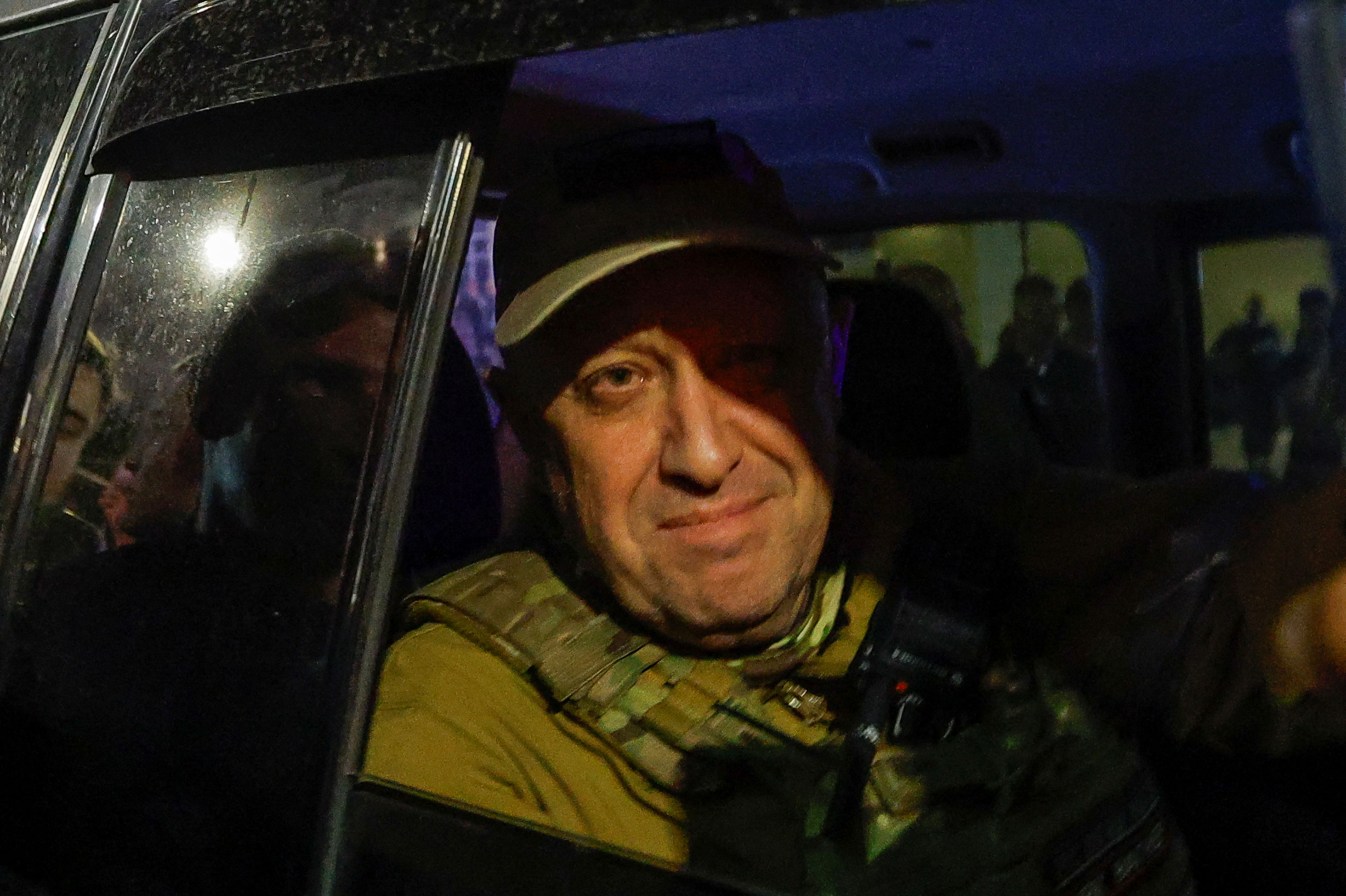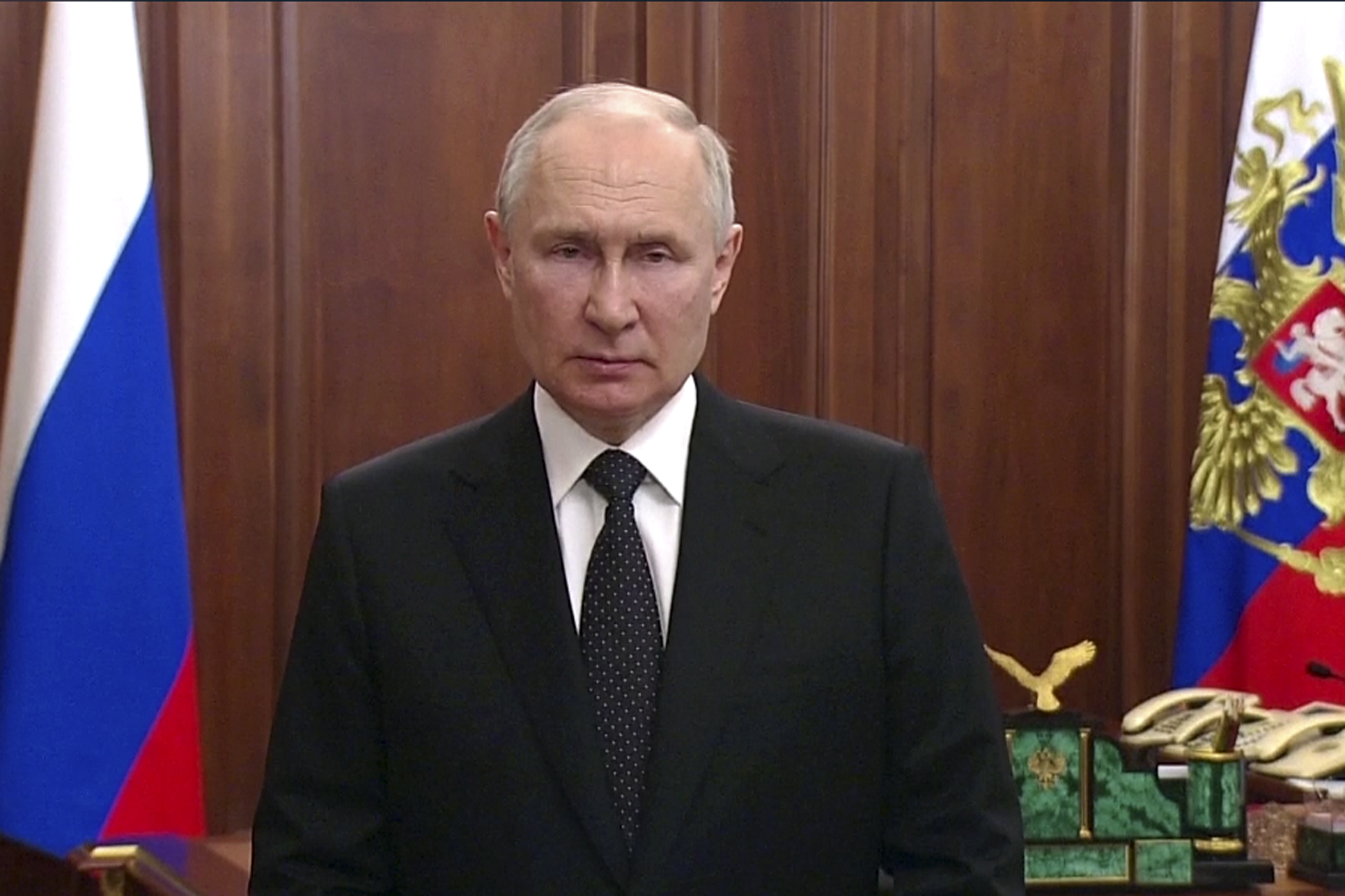begin partial quote from:
https://www.cnn.com/europe/live-news/russia-ukraine-war-news-06-26-23/h_f3fe0563b311fc748d807da3878c923e
Prigozhin says march toward Moscow was a demonstration of protest and not intended to overturn power
From CNN's Mariya Knight, Anna Chernova and Katharina Krebs

Wagner boss Yevgeny Prigozhin released new audio Monday explaining his decision to turn around his march on Moscow.
Prigozhin said he wanted to avoid Russian bloodshed and also said the march was a demonstration of protest and not intended to overturn power in the country.
This is Prigozhin's first audio message since announcing on Saturday night that his column was turning back "to avoid bloodshed."
"Overnight, we have walked 780 kilometers (about 484 miles). Two hundred-something kilometers (about 125 miles) were left to Moscow," Prigozhin claimed in the latest audio message, despite no evidence that his Wagner forces made it that close to the Russian capital. “Not a single soldier on the ground was killed."
“We regret that we were forced to strikes on aircraft," he said. "...but these aircraft dropped bombs and launched missile strikes."
The Wagner boss also claimed in the audio message that about 30 of his fighters died in the Russian military's attack on the mercenary group on Friday. Prigozhin said the attack came days before Wagner was due to leave its positions on June 30 hand over equipment to the Southern Military District in Rostov, Russia.
The purpose of his forces' march toward Moscow, the Wagner boss said, was to prevent the "destruction" of Wagner private military company, and "to bring to justice those who, through their unprofessional actions, made a huge number of mistakes during the special military operation."
Prigozhin said the march stopped when the detachment "made a reconnaissance of the area, and it was obvious that at that moment a lot of blood would be shed. We felt that demonstrating what we were going to do was sufficient."
"At this time, Alexander Lukashenko extended his hand and offered to find solutions for the further work of Wagner PMC in legal jurisdiction," he added.
More background: Prigozhin had agreed to leave Russia for Belarus on Saturday following a deal apparently brokered by Belarusian President Alexander Lukashenko which ended the armed rebellion.
According to Russian Foreign Minister Sergey Lavrov, Lukashenko had suggested the deal to Russian President Vladimir Putin to help resolve the brief mutiny, during a telephone conversation on Saturday morning in order to "avoid the great bloodshed that would inevitably occur if the rebel detachments continued to move towards Moscow. This proposal was supported by President Putin."
US diplomats were busy sending messages to Russian officials over the weekend
From CNN's Kylie Atwood
As Wagner chief Yevgeny Prigozhin’s insurrection attempt played out over the weekend, US officials were publicly quiet, wary that any comments they made could be perceived by Russian President Vladimir Putin as the US escalating the crisis. But US diplomats were busy sending messages to Russian officials.
Diplomats, including the US ambassador to Russia Lynne Tracy, conveyed two main messages: the US expects Russia to uphold their obligation to ensure safety and security of the US embassy and personnel, and the US was “not involved in this matter and would not involve ourselves,” a senior State Department official explained.
Another message that was sent to Russian officials from US officials included a push for Russia not to use its nuclear arsenal, another US official explained.
Russian Foreign Minister Lavrov described these messages on Monday.
“When US Ambassador [Lynne] Tracy spoke with Russian representatives yesterday, she gave signals. These signals were primarily that the United States had nothing to do with it, that the United States very much hopes that nuclear weapons will be in order, that American diplomats will not suffer,” Lavrov said speaking on a state-controlled broadcaster.
US Secretary of State Antony Blinken gave the orders to send these messages.
“I instructed my own team at the president’s behest to engage with the Russians, “ Blinken said on CBS on Sunday.
US was not involved in rebellion in Russia, White House says
From CNN's Arlette Saenz
The White House said the US was not involved in the rebellion in Russia after Russian Foreign Minister Sergey Lavrov said the country's special services are investigating whether Western intelligence services were engaged in the events that unfolded this weekend.
“The United States was not involved and will not get involved in this situation. This was an internal Russian matter,” National Security Council spokesperson Adam Hodge said.
Earlier Monday, Lavrov told Russia Today that while his department was not involved in evidence gathering of illegal activities, Russian services were looking at possible foreign intervention.
He was asked: “Do you have proof that neither Ukraine nor the West was involved in the mutiny?”
Lavrov answered: “I’m working in a department that is not engaged in gathering evidence of committed illegal actions. But we have such services and I assure you, they are already looking into that.”
He also said the US ambassador to Russia signaled the US had “nothing to do” with events this weekend.
CNN's Anna Chernova contributed reporting to this post.
Wagner recruitment centers resume work in Russian cities of Tyumen and Novosibirsk, state media reports
From CNN's Katharina Krebs in London
Wagner Group recruitment centers in the Russian cities of Tyumen and Novosibirsk have resumed recruiting fighters, according to Russian state media on Monday, following temporary closures over the weekend due to the armed Wagner Group rebellion.
"The recruitment center for PMC 'Wagner' fighters in Tyumen has resumed its work as normal," an employee of the center told TASS.
The Wagner recruitment center in Novosibirsk, in southern Siberia, also resumed work on Monday, according to state media.
"A TASS correspondent reports that advertising posters have been hung back up again at the entrance to the center located in the center of Novosibirsk. On Saturday, the banners were removed, the center stopped working," TASS reported.
The Wagner Group center in St. Petersburg also told CNN on Monday that the center "continues to operate as usual in accordance with the legislation of the Russian Federation."
Analysis: The insurrection was stymied, but Russia is a changed place
From CNN's Tim Lister

The weekend’s events in Russia seem an almost surreal interruption to the long slog of conflict unfolding in neighboring Ukraine. Yevgeny Prigozhin’s challenge to the Russian state erupted and receded in the space of 24 hours, but the consequences of his short-lived mutiny may reverberate for much longer.
The brief drama forced a visibly angry President Vladimir Putin to address the nation early on Saturday and threaten Prigozhin with dire consequences, even raising the specter of civil war in the process. The much-prized sense of national purpose in an existential struggle against what Moscow falsely claims are Ukrainian neo-Nazis that were creatures of the West was punctured by what was at times a day of melodrama.
Some moments, such as the hasty erection of roadblocks on Moscow’s southern outskirts and the mobilization of Chechen special forces to move on Rostov, were reminiscent of the 1991 attempted coup by Soviet hardliners against Mikhail Gorbachev – not in a political sense but for the haphazard and inchoate nature of events.
Above all, the day exposed the transactional nature of relationships among Russian elites. What had begun as “treasonous” behavior and a criminal challenge to the state that must be ruthlessly dealt with ended with a tawdry deal brokered by the dictator next door that gave Prigozhin a “get-out-of-jail-free card,” and amnesty to the mutineers advancing on Moscow.
This was not lost on Kyiv, with an adviser to the head of the Ukrainian president’s office, Mikhailo Podolyak, saying that “at the end of the day, everything goes back to normal, (Prigozhin) is not a traitor, he is a hero of Russia, and so on. It’s a failed state.”
Russian state media has gone to great lengths to show how Putin was in control throughout. “The whole night the president has been in touch with all law enforcement structures,” said Pavel Zarubin, a state TV reporter on Sunday.
But as Prigozhin was granted an escape route hours after betting the farm on overthrowing the military establishment, his departure from the scene still left Putin looking weaker, even a touch naïve.
No comments:
Post a Comment